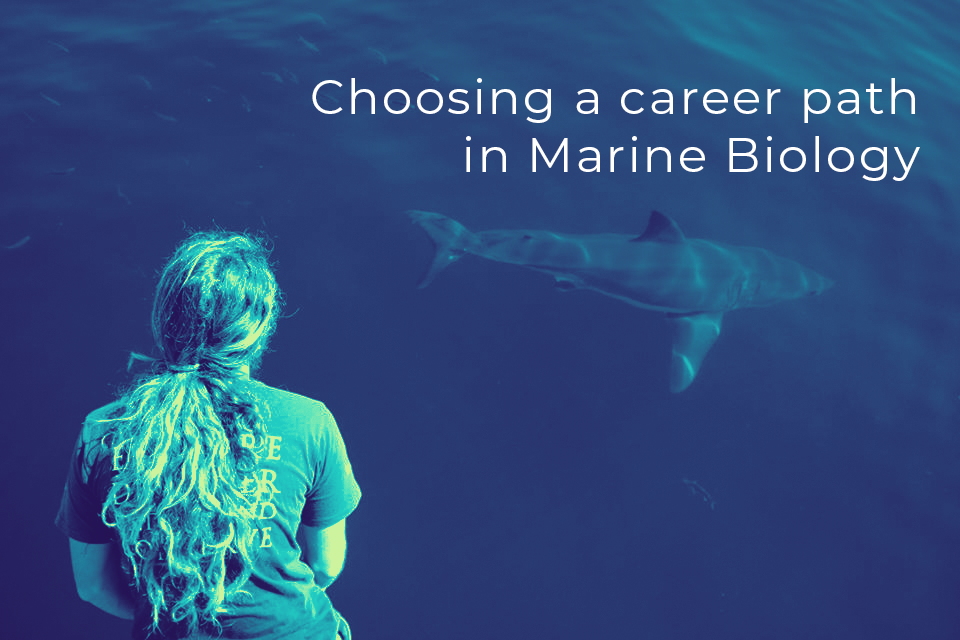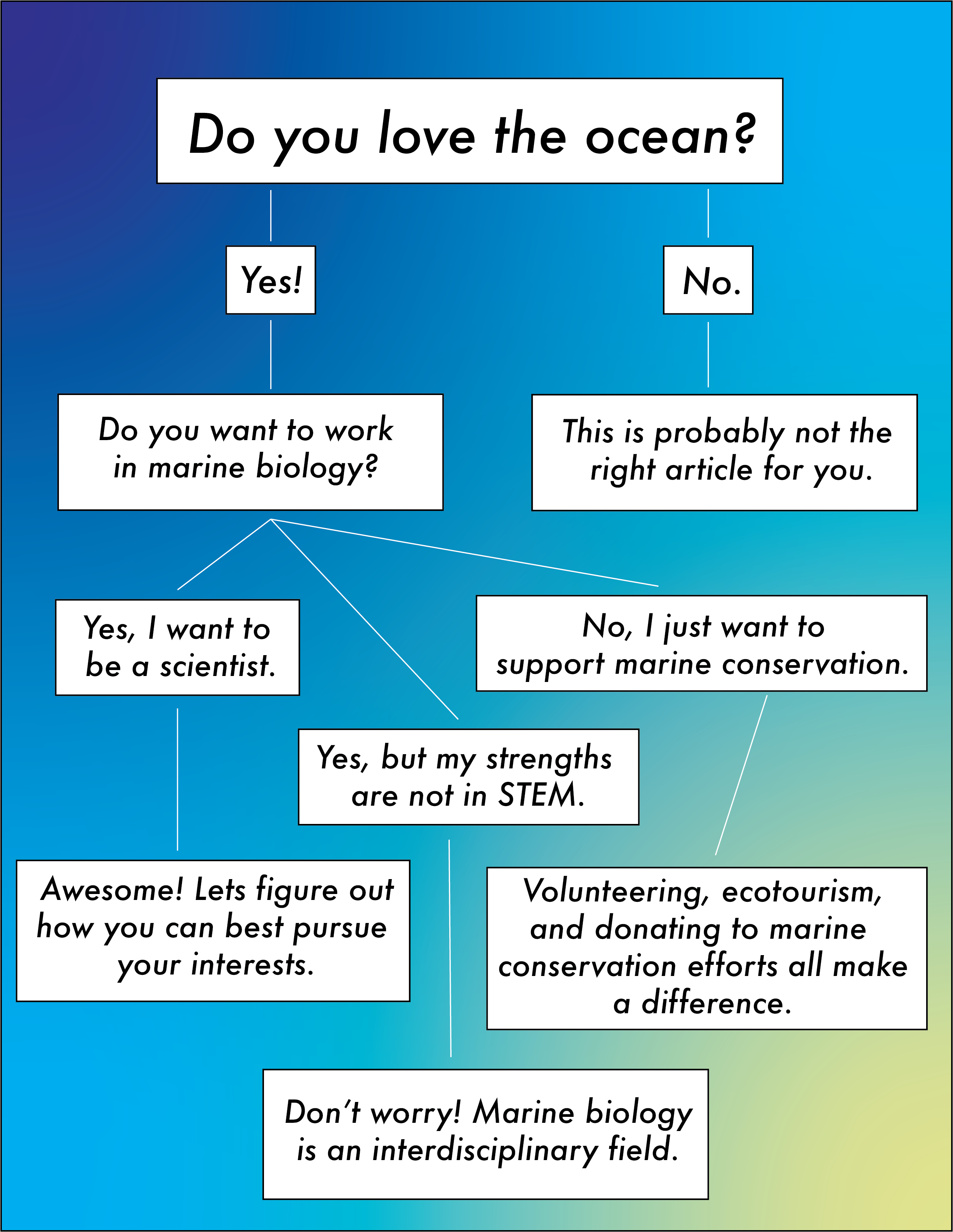
Choosing a Path in Marine Biology
Posted by Maria Geoly on February 11, 2023
A simple guide for choosing a career path in marine biology
Choosing a career path in marine biology can be daunting. As one can likely imagine, there are as many different fields of study in the world of marine biology as there are types of fish in the sea (and teleost fish are the most speciated vertebrates on our planet!). Whales, dolphins, corals, fisheries, sharks, where does one begin?
People from our field are often told, “I wanted to be a marine biologist when I grew up”. For many people in our line of work, our job began at a young age with a fascination for the ocean. Childhood interests in great white sharks became repeated trips to our local library to check out books on shark biology, taping Shark Week on TV, and many, many trips to aquariums. As we got older, we may have looked for summer camps and shark internships where we could hopefully spend time with these beautiful animals, and when it came time for college we looked for programs that could jumpstart our careers to working with our favorite creatures. However, there are many factors that can mitigate a child’s ability to follow their passions into adulthood, including access to information and financial ability.
We are here to tell you that not everyone’s path to marine biology is linear, nor does it have to start at a young age. Many people find marine biology later in life. We hope this article can help budding scientists, no matter where they are in their career, to find a starting point for integrating their love for the ocean into their current path.
To start, we created this flow chart;

Marine biology is incredibly interdisciplinary. We rely on a variety of skill sets from traditional STEM, social sciences, communications, and even middle-skill job techniques to effectively collect, analyze, publish, and share our work. Assuming you utilized our chart, we will now go through each answer explaining relevant skills, steps you can take to achieve your goal, and real-life examples of each pathway.
Pursuing Marine Biology Through Academia
Being a scientist, with all of its stereotypical math and long nights in the lab, necessitates creativity and passion as much as it does calculus.There is so much that we don’t know about the vast blue and an equal amount in our tidepools. Lucky for you, that means there are a lot of opportunities for new discoveries. Academic pursuits in the field can come through undergraduate and graduate degrees, teaching assistantships, professors, tenure track, and university affiliation. Although you may already have an idea of what you want to study, here is a small lists of fields of research you may not know exists:
- Invasive invertebrate ecology
- Anthropogenic influence on marine predators
- Bioacoustics of reefs
These three areas require a combination of quantitative skills to answer research questions, such as:
- Field research techniques
- Understanding and application of statistics
- Ability to write/use code
We would like to note that in school, prerequisites for degrees in the field often include physical sciences such as calculus, chemistry, and physics. It is beneficial to understand these fundamentals to later apply them to your field of research. Exposing yourself to research techniques via marine biology internships is a great way to increase neural plasticity between what you know through general academia and real world applications of marine biology.
Pursuing Marine Biology Through Non-Academic Avenues
So, you love the ocean but you hate math. Or maybe you love the oceans and math, but you’re more interested in how people interact with their environment? Non-academic marine biology jobs come in many different shapes and sizes. They can be lab, office, or field-based and can range from social science surveying, resource management, or scientific diving to science communication, and conservation photography or videography. There are varying levels of interaction with kids, adults, the environment, media, and creative media. All of these jobs have the same common threads: a passion for the sea and a solid understanding of marine biology.
Recommended Experiences Before Taking the Leap
Before you fully pursue this passion, we recommend gaining some experience with the animal or intended career of your choice, plus a little bit more. You may dream of research now, but the field can be a hard, unforgiving place. Data collection varies among subjects (and water temperatures). If you’re in high school, getting involved with local research programs, such as a summer camp or volunteering at your local aquarium or museum), is a great place to start. There are many programs with scholarships available if cost is an issue, MISS and NOAA offer scholarships for certain programs and demographics. For high school and older, we recommend free online classes in R, we promise it will make life easier.
For college students, look for internships that code for class credit or are paid. Field research courses that expose you to many different sampling techniques and subject areas are great if you aren’t sure where you want to start. Marine biology is not for the faint of heart, so be prepared to step out of your comfort zone. If you cannot participate in in-person research, or are landlocked, there are plenty of non-marine related skills that are incredibly helpful. A background in statistics, teaching, GIS work, writing grants, writing press releases, team building, physical training, scuba diving, species ID (this can be land species as experience-it still teaches you techniques beyond the identifications themselves), are all great examples of applicable skills in the realm of marine biology.
Contributing Time and Resources
Lastly, if you love marine biology but aren’t quite sure if you want to switch careers or just want to support marine conservation, consider volunteering for an NGO, government organization, your local aquarium or zoo, natural history museum, or putting your time into your community. Through volunteering, you can give your time and resources to a cause you care about while having new experiences. NGOs around the world have volunteer opportunities, including Oceans Research Institute.
It is never too late to have a role in marine conservation. If you are interested in pursuing your passion in marine biology, Oceans Research is happy to answer any questions or help start your career. Questions regarding anything aforementioned are welcome on our instagram or at info@oceans-research.com